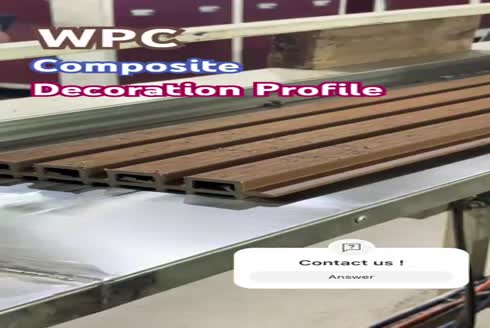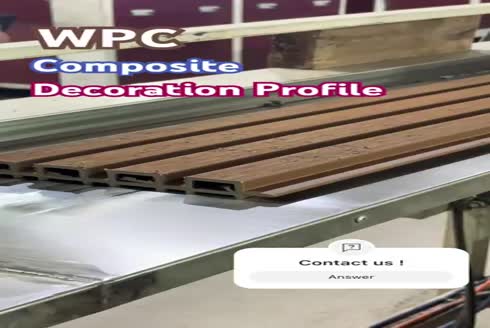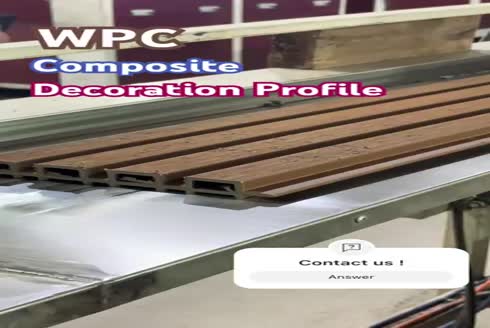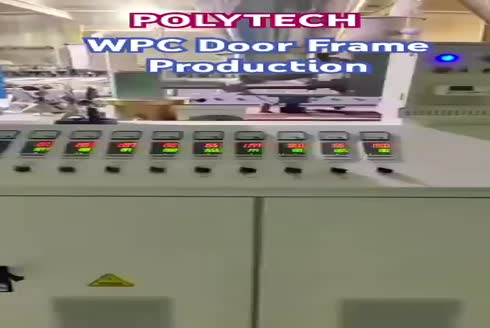2x150 mm High Performance PVC Window Profile Extrusion Line

2x150 mm (400-500 kg/h) High-Performance PVC Window Profile Extrusion Line
The PVC window profile extrusion line is a production system that shapes PVC material into window frames and related components by melting PVC. This process involves passing PVC through an extruder, transforming it into profiles through a mold, cooling and calibrating the shape, and cutting it to the desired size. This method typically produces durable, energy-efficient, and low-maintenance window profiles used in construction.
Features and Applications:
The PVC window profile extrusion line includes an extruder, calibration system, cooling unit, and cutting mechanisms to produce precise window profiles. It offers high customization for various shapes and sizes, providing strong control over material quality, temperature, and dimensions. Application areas include the production of energy-efficient, low-maintenance window and door frames for residential, commercial, and industrial buildings. The line is also used in the production of other profiles such as ventilation systems, glazing beads, and reinforcement components.
Technical Parameters of 240 mm High-Performance PVC Window Profile Extrusion Line:
|
Technical Specifications: |
Classic Type |
High-Speed Type |
||||||
|
Type |
YF108 |
YF240 |
YF240A |
YF300 |
YF400 |
YF240 |
YF240 |
YF240A |
|
Maximum Width of Product (mm) |
108 |
240 |
150*2 |
300 |
400 |
240 |
240 |
150*2 |
|
Extruder Model |
SJZ55/110 |
SJZ65/132 |
SJZ65/132 |
SJZ65/132 |
SJZ80/156 |
SJP75/28 |
SJP93/30 |
SJP110/28 |
|
Maximum Extrusion Capacity (kg/h) |
110 |
180 |
180 |
180 |
320 |
150-250 |
250-400 |
400-500 |
|
Extruder Power (kw) |
22 |
37 |
37 |
37 |
55 |
45 |
55 |
90 |
|
Cooling Water (m3/h) |
7 |
8 |
8 |
8 |
10 |
7 |
8 |
10 |
|
Compressed Air (m3/min) |
0.6 |
0.6 |
0.8 |
0.6 |
0.6 |
0.6 |
0.6 |
0.8 |
Benefits of Using PVC Profile Production Equipment
The use of PVC profile production equipment offers high efficiency, precise molding, and customization for various profiles. These equipment enable fast production with minimal material waste, producing durable and low-maintenance products. Additionally, they provide a cost-effective solution by reducing labor and material costs. The use of recyclable materials supports environmentally friendly production.
-
Choosing the Right PVC Window Frame Extrusion Line
-
When selecting a PVC window frame extrusion line, consider automation features for production volume, design flexibility, and efficiency. By choosing a line from a reliable brand that offers low maintenance requirements, energy efficiency, and consistent quality, you can ensure long-term durability.
uPVC Window Profile Extrusion Line
The uPVC window profile extrusion line creates window frame profiles by melting uPVC material. This system produces durable, low-maintenance profiles for precision, efficiency, and energy-saving windows.
Components of Plastic Profile Extrusion Line
A typical plastic profile extrusion line consists of the following components:
-
Extruder: Melts and blends raw materials.
-
Die: Shapes molten plastic into the desired profile.
-
Cooling System: Cools and solidifies the extruded profile.
-
Haul Off: Pulls the profile at a consistent speed and shape along the line.
-
Cutter: Cuts the profile to the desired length.
-
Control System: Monitors and adjusts temperature, speed, and other parameters for optimal performance.
These components work together to efficiently produce high-quality plastic profiles.
Advancements in PVC Profile Extrusion Technology
Recent advancements in PVC profile extrusion technology include:
-
Smart Controls: Enhanced PLC and IoT integration for real-time monitoring and automatic adjustments.
-
Energy-Saving Features: Improved motors and efficient heating systems that reduce energy consumption.
-
Fast Production: Enhanced screw and mold designs for higher output and faster cooling.
-
Customization: More flexible systems that provide precise profile shapes, sizes, and multilayer designs.
-
Reduced Waste: Innovations in material handling and extrusion that reduce scrap rates and enhance material usage.
These innovations increase productivity, reduce costs, and support environmentally friendly production practices.

















